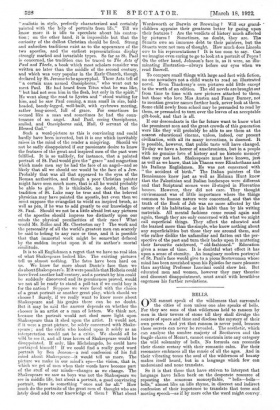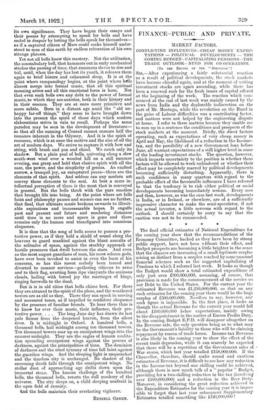BELLS.
ONE cannot speak of the wilderness that surrounds the cities of men unless one also speaks of bells. For they are sons of that wilderness held to ransom by men in their towers of stone till they shall divulge the secrets of space and time and disclose the mystery of their own power. And yet that ransom is never paid, because those secrets can never be revealed. The aesthetic, which can analyse the sombre majesty of Beethoven and the fragile charm of Mozart, cannot constrain into any category the wild solemnity of bells. No formula can reconcile their classic ecstasy with their romantic calm. For their resonance embraces all the music of all the ages. And in their vibrating tones the soul of the wilderness of beauty makes itself heard, but in a language which few can understand and none translate.
So it is that those that have striven to interpret that language have fallen back on the desperate resource of repeating the sonorous monosyllable, " bells—bells—. bells," almost like an idle rhyme, in discreet and indirect confession of their impotence to translate that terse and moving speech—as if by mere echo the word might convey _ its own significance. They have begun their essays and their poems by attempting to speak for bells and have ended in despair by letting the bells speak for themselves— as if a captured citizen of Mars could make himself under- stood to men of this earth by endless reiteration of his own strange phrases.
Yet not all bells know this mastery. Not the utilitarian, the constabulary bell, that hammers out in surly mechanical strokes the passing of time, that summons slaves to rise and toil, until, when the day has lost its youth, it releases them again to brief leisure and exhausted sleep. It is at the point where campanology begins, at the point where bells almost merge into formal music, that all this spiritual meaning arises and all this emotional force is born. Not that even such bells owe any debt to the power of formal music, to which they are anterior, both in their history and in their essence. They are at once more primitive and more subtle. Born in a distant age amid the "old un- happy far-off things," they seem to have brought down into the present the spirit of those days which modern elaborations strive in vain to recall. Perhaps the same paradox may be seen in the development of literature- s° that all the cunning of Conrad cannot ensnare half the romance inherent in the Odyssey. And it is the spirit of romance, which is at once the motive and the aim of all the art of modern days. We strive to capture it with bow and string, with brush and pen and chisel. We catch only its shadow. But a plain peal of bells, quivering along a slow south-west wind over a wooded hill on a still summer evening, can grasp and hold that elusive spirit with all the ease, the power, and the simplicity of genius. An exalted sorrow, a tranquil joy, an enraptured peace—these are the elements of that spirit. And seldom can any modern art convey those elements to the soul. At best a mere in- tellectual perception of them is the most that is conveyed in general. But the bells throb with the pure emotion that brought life into being. At the point where art falls faint and philosophy pauses and science can see no further, that final, that ultimate music beckons onwards to illimit- able aspirations and immeasurable hopes. It engulfs past and present and future and sundering distances until time is no more and space is gone and there remains only the human soul transfigured into conscious eloquence.
It is thus that the song of bells, seems to possess a pro- tective power, as if they held a shield of sound along the heavens to guard mankind against the blunt assaults of the solitudes of space, against the stealthy approach of hostile presences that dwell between the stars. And even as the most august guardians of man, his most solemn gods, have ever been invoked to assist in even the least of his concerns, so has this rarest melody been tamed and diverted to meaner services—gathering citizens to arms and to their flag, averting from ripe vineyards the ominous clouds, hailing with forced joy the marriages of kings, ringing farewells to the dead.
But it is in old cities that bells chime best. For there they are attuned to the spirit of the place, and the weathered towers are as old as they. There they can speak in moving and measured tones, as if impelled to confident eloquence by the presence of familiar friends. To hear them thus is to know for ever their music, their influence, their pro- tective power. . . . The long June day has drawn its last pale flames from the deepened heaven, from the silent river. It is midnight in Oxford. A hundred bells, a thousand bells, hail midnight among ten thousand towers. Ten thousand towers soar up on omnipotent wings into the summer midnight. They are the eagles of human medita- tion spreading omnipotent wings against the powers of darkness, against the principalities of time. The dominion of darkness and the cruel tyranny of time fall faint against the guardian wings. And the sleeping light is unquenched and the timeless city is unchanged. No shadow of the oncoming death falls through the omnipotent wings. No stellar dust of approaching age drifts down upon the immortal stone. The human challenge of the hundred bells, the thousand bells, retorts the dull mockery of the universe. The city sleeps on, a child sleeping unafraid in the open field of eternity.
4nd the bells maintain their everlasting vigilance.
RUSSELL GREEN.



































 Previous page
Previous page